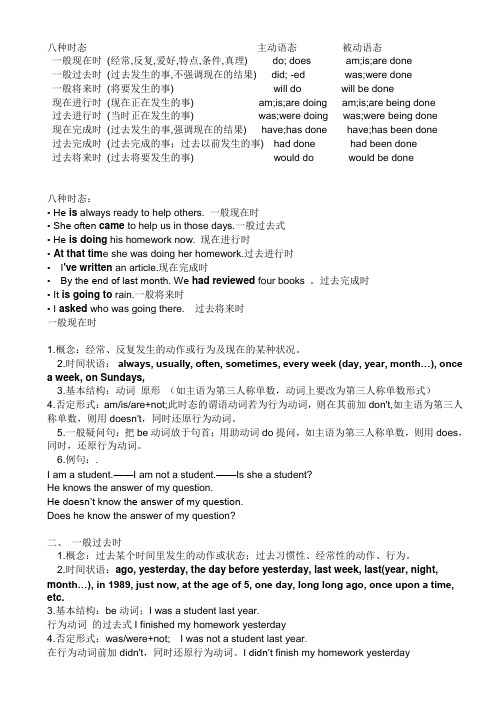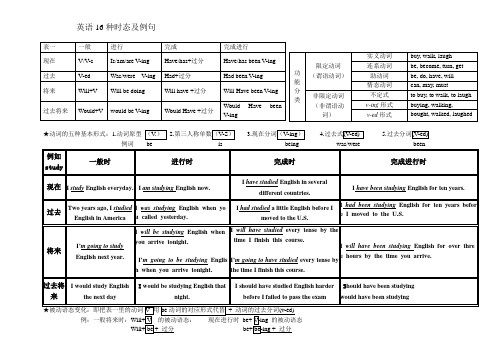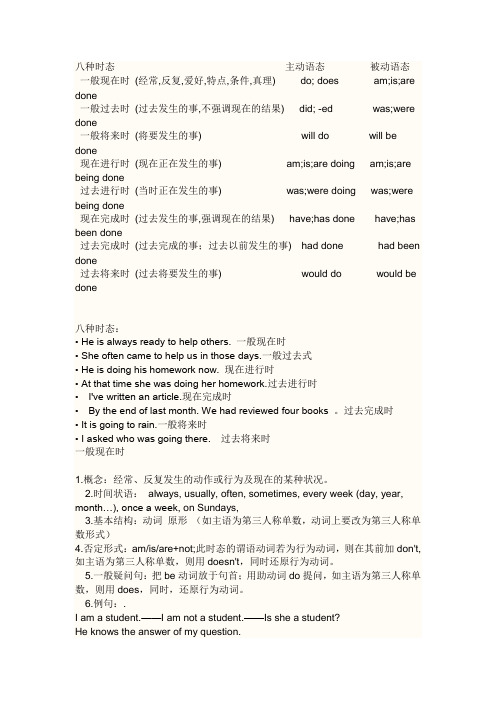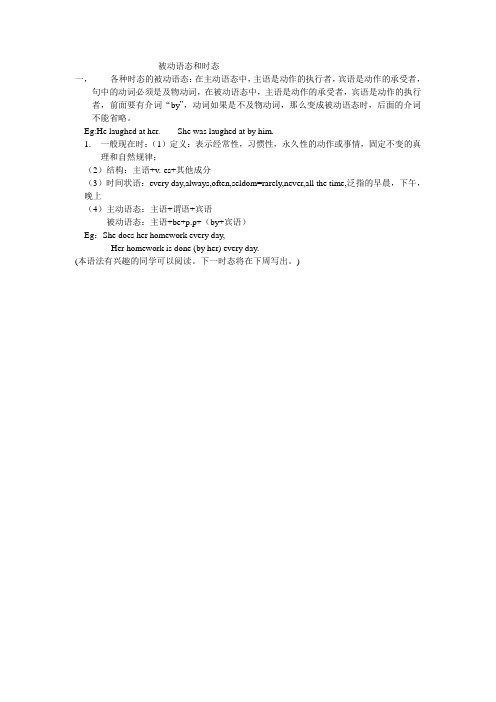时态和被动语态
八种时态主动语态被动语态

八种时态主动语态被动语态一般现在时(经常,反复,爱好,特点,条件,真理) do; does am;is;are done一般过去时(过去发生的事,不强调现在的结果) did; -ed was;were done一般将来时(将要发生的事) will do will be done现在进行时(现在正在发生的事) am;is;are doing am;is;are being done过去进行时(当时正在发生的事) was;were doing was;were being done现在完成时(过去发生的事,强调现在的结果) have;has done have;has been done过去完成时(过去完成的事;过去以前发生的事) had done had been done过去将来时(过去将要发生的事) would do would be done八种时态:• He is always ready to help others. 一般现在时• She often came to help us in those days.一般过去式• He is doing his homework now. 现在进行时• At that tim e she was doing her homework.过去进行时• I've written an article.现在完成时• By the end of last month. We had reviewed four books 。
过去完成时• It is going to rain.一般将来时• I asked who was going there. 过去将来时一般现在时1.概念:经常、反复发生的动作或行为及现在的某种状况。
2.时间状语:always, usually, often, sometimes, every week (day, year, month…), oncea week, on Sundays,3.基本结构:动词原形(如主语为第三人称单数,动词上要改为第三人称单数形式)4.否定形式:am/is/are+not;此时态的谓语动词若为行为动词,则在其前加don't,如主语为第三人称单数,则用doesn't,同时还原行为动词。
英语16种时态及被动语态_表格打印版

英语16种时态及例句★动词的五种基本形式:1.动词原型 (V .) 2.第三人称单数(V -S ) 3.现在分词(V -ing ) 4.过去式(V -ed) 5.过去分词(V -ed)例词 be is being was/were been例如study一般时 进行时 完成时完成进行时现在 I study English everyday. I am studying English now.I have studied English in severaldifferent countries.I have been studying English for ten years.过去Two years ago, I studied English in America I was studying English when you called yesterday.I had studied a little English before I moved to the U.S. I had been studying English for ten years before I moved to the U.S.将来I’m going to study English next year.I will be studying English when you arrive tonight.I’m going to be studying Englis h when you arrive tonight. I will have studied every tense by the time I finish this course.I’m going to have studied every tense by the time I finish this course.I will have been studying English for over three hours by the time you arrive. 过去将来 I would study English the next dayI would be studying English thatnight.I should have studied English harder before I failed to pass the examS hould have been studying would have been studying★被动语态变化:即把表一里的动词V 用be 动词的对应形式代替 + 动词的过去分词(v-ed) 例:一般将来时:Will+ V 的被动语态: 现在进行时 be+ V-ing 的被动语态 Will+ be + 过分 be+ be-ing + 过分功能分类 限定动词 (谓语动词) 实义动词buy, walk, laugh 连系动词 be, become, turn, get 助动词 be, do, have, will 情态动词 can, may, must非限定动词 (非谓语动词)不定式 to buy, to walk, to laugh v-ing 形式 buying, walking,v-ed 形式bought, walked, laughed表一 一般 进行完成完成进行现在 V/V -s Is/am/are V -ing Have/has+过分 Have/has been V -ing 过去 V -ed Was/were V -ing Had+过分 Had been V -ing 将来 Will+VWill be doingWill have +过分 Will Have been V -ing 过去将来Would+V would be V -ingWould Have +过分Would Have beenV -ing。
动词的时态和被动语态

第七讲动词的时态和被动语态一、动词的时态概述时态(tense)是一种语法范畴,是谓语动词所表示的动作或情况发生时间的各种形式。
动词的“时”是指动词所指的动作发生的时间区别,它与日常生活中人们的“时间”观念既有联系,又不完全等同。
动词的“态”是指动词所指动作或过程所处的状态。
时间有四个主要部分,即:现在、过去、将来。
动作方面也有四种,即一般、完成、进行和完成进行。
将这些“时”和“态”的形式组合在一起,就构成了以下十六种英语时诚,以动词do 为例列表如下:在实际应用中,最为常用的时态有五种:一般现在时、现在进行时,现在完成时、一般过去时和一般将来时。
其次较为常用的时态还有过去进行时、过去完成时、过去将来时和现在完成进行时等。
二、十种常用时态的基本用法1. 一般现在时一般现在时(the present tense)指未与进行体或完成体等相结合的现在时动词形式。
其动词的现在时与原形同形。
当主语为第三人称单数时,须在词尾加-s或-es。
具体变化规则是:1)大多数动词之后直接加-s。
如:laugh → laughs work → works drop → drops (-s在清辅音后读[s])gather → gathers play → plays dream → dreams(-s在浊辅音和元音后读[z])let → lets stand→stands (-s在t后与之一起读[ts], 在-d后与之一起读[dz])2) 以字母o, s, x, ch, sh结尾的动词,后面加-es。
如:do → does miss → misses mix→ mixes touch → toucheswash → washes catch → catches (-es在o后读[z],其余的读[iz])3)在辅音字母+y结尾的单词后,去y再加-ies。
如dry → dries try → tries beautify → beautifies (-es读[z])4) 动词have 的第三人称单数为has。
八种时态的结构和被动语态

八种时态的结构和被动语态一、一般现在时态一般现在时态表示经常性的动作或状态。
在句子中,主语加上动词的原形即可构成一般现在时态的句子。
例句:Dogs bark.(狗叫。
)被动语态:由“be+过去分词”构成。
例句:The cake is baked by my mother.(蛋糕是我妈妈烤的。
)二、一般过去时态一般过去时态表示过去某个时间发生的动作或存在的状态。
在句子中,主语加上动词的过去式即可构成一般过去时态的句子。
例句:She ate an apple yesterday.(她昨天吃了一个苹果。
)被动语态:由“was/were+过去分词”构成。
例句:The book was written by Mark Twain.(这本书是马克·吐温写的。
)三、一般将来时态一般将来时态表示将要发生的动作或存在的状态。
在句子中,主语加上助动词“will”或“shall”,再加上动词的原形即可构成一般将来时态的句子。
例句:I will visit my grandparents next week.(我下周会去看望我的祖父母。
)被动语态:由“wil l be+过去分词”或“is/am/are going to be+过去分词”构成。
例句:The letter will be delivered by the postman.(这封信将由邮递员投递。
)四、现在进行时态现在进行时态表示现在正在进行的动作。
在句子中,主语加上“be”动词的现在分词形式,再加上动词的原形即可构成现在进行时态的句子。
例句:She is watching TV now.(她正在看电视。
)被动语态:由“am/is/are being+过去分词”构成。
例句:The house is being cleaned by the maid.(房子正在被女仆打扫。
)五、过去进行时态过去进行时态表示过去某个时间正在进行的动作。
在句子中,主语加上“was/were”动词的现在分词形式,再加上动词的原形即可构成过去进行时态的句子。
英语16种时态与被动语态

英语中的16种时态与被动语态※ 1.一般现在时※基本结构:S + V(原形)被动语态:受动者+ am / is / are + V(过去分词)※ 2.一般过去时※基本结构:S + V(过去式)被动语态:受动者+ was / were + V(过去分词)※ 3.一般将来时※基本结构: S + will / shall / be (am / is / are) going to +V(原形)被动语态:受动者+ will + be + V(过去分词)※ 4.一般过去将来时※基本结构:S + would + V(原形)被动语态:受动者+ would + be + V(过去分词)基本结构:S + am / is / are + V ing被动语态:受动者+ am / is /are + being + V(过去分词)※ 6.过去进行时※基本结构:S + was / were + V ing被动语态:受动者+ was / were + being +V(过去分词)※7.将来进行时※基本结构:S + will + be + V ing被动语态:受动者+ will + being + V(过去分词)※8.过去将来进行时※基本结构:S + would + be + V ing被动语态:受动者+ would + being + V(过去分词)基本结构:S + have / has + V(过去分词)被动语态:受动者+ have / has + been + V(过去分词)※10.过去完成时※基本结构:S + had + V(过去分词)被动语态:受动者+ had + been +V(过去分词)※11.将来完成时※基本结构:S+will+have+V(过去分词)被动语态:受动者+ will + have + been + V(过去分词)※12.过去将来完成时※基本结构:S + would + have + V(过去分词)被动语态:受动者+ would + have + been + V(过去分词)基本结构:S + have / has / + been + V ing被动语态:受动者+ have + has + been + being + V(过去分词)※14.过去完成进行时※基本结构:S + had + been + V ing被动语态:受动者+ had + been + being + V(过去分词)※15.将来完成进行时※基本结构:S + will + have + been + V ing被动语态:受动者+ will + have + been + being + V(过去分词)※16.过去将来完成进行时※基本结构:S + would + have + been + V ing被动语态:受动者+ would+ have+ been +being + V(过去分词)。
8种时态的被动语态

动词的语态:主动语态和被动语态被动语态的基本结构:Be + done(过去分词)1、一般现在时:(主动语态)I help you.发出者动词承受者变为被动语态:Do——am/is/are doneYou are helped by me.承受者谓语发出者2、一般过去时的被动:did——was/were done(I helped you.-每个例子可让学生自己先尝试变被动,再给答案)3、一般将来时的被动:Will do——will be done(I will help you.-)4、现在进行时的被动:Am/is/are doing ——Am/is/are being done(I am helping you.-)5、过去进行时的被动:Was/were doing——Was/were being done(I was helping you.-)6、现在完成时的被动:Have done——have been done (I have helped you.-)7、过去完成时的被动:Had done——had been done (I had helped you.-)8、过去将来时的被动:Would do ——would be done (I would help you.-)答案:2、You were helped by me.3、You will be helped by me.4、You are being helped by me.5、You were being helped by me.6、You have been helped by me.7、You had been helped by me.8、You would be helped by me.。
高中十种时态及被动语态

精心整理高二暑期课程一高考十种英语时态及被动语态知识梳理十种时态一.一般现在时1)经常性或习惯性的动作,常与表示频度的时间状语连用。
时间状语:every…,sometimes,at…,onSunday等。
Ileavehomeforschoolat7everymorning.2)客观真理,客观存在,科学事实。
Theearthmovesaroundthesun.3)表示格言或警句中。
Pridegoesbeforeafall.Columbusprovedthattheearthisround.4)现在时刻的状态、能力、性格、个性。
AnnWangwritesgoodEnglishbutdoesnotspeakwell.5)一般现在时表将来,主要用来表示在时间上已确定或安排好的事情,或用在倒装句中。
Thetrainleavesatsixtomorrowmorning.Herecomesthebus.=Thebusiscoming.WhenBillcomes,askhimtowaitforme.I'llwritetoyouassoonasIarrivethere.二、一般过去时的用法1)在确定的过去时间里所发生的动作或存在的状态。
时间状语有:yesterday,lastweek,anhourago,theotherday,in1982等。
Wheredidyougojustnow?IsawTominthestreetyesterday.2)表示在过去一段时间内,经常性或习惯性的动作。
WhenIwasachild,Ioftenplayedfootballinthestreet.3)用过去时表示现在,表示语气委婉礼貌。
Didyouwanttospeaktomenow?Iwonderedifyoucouldhelpme.Couldyoulendmeyourbike?4)用在虚拟语气中。
IfIwereabird,IwouldflytoBeijing.特殊句式◎Itistimeforsb.todosth“到……时间了;该……了”,Itistimesb.didsth.“时间已迟了;早该……了”,例如:Itistimeforyoutogotobed.你该睡觉了。
英语的16种时态、被动语态和例句分类总结

英语的16种时态,及其被动语态(be + V过去分词)。
1.一般现在时用原形V 或 V+esI often watch TV.我经常看电视。
TV is often watched by me.电视经常被我观看。
2.一般过去时用动词过去时I watched TV just now.我刚才还在看电视。
TV was watched by me just now.电视刚才被我看。
3. 一般将来时 will + 动词原形或be going to + 动词原形I will visit the zoo on Sunday.我星期天要去动物园。
The zoo will be visited by me on Sunday.这个动物园在星期天要被我参观。
(注意这里will可以用is going to代替)4. 过去将来时 would + 动词原形或 was/were going to + 动词原形Yesterday he told me he would visit the zoo next Sunday.昨天他告诉我他下个星期天要去动物园。
Yesterday he told me the zoo would be visited by him next Sunday. (单被动)Yesterday I was told by him the zoo would be visited by him next Sunday. (双被动) (注意,这里would 可以用 was going to 代替)5. 现在进行时 be + vingI am watching TV.我正在看电视。
TV is being watched by me.电视正在被我看。
6. 过去进行时 was/were + vingI was watching TV when you came in.当你进来的时候,我正在看电视。
TV was being watched by me when you came in. 当你进来的时候,电视正在被我看。
英语时态结构及被动语态

被动语态比较主动语态与被动语态:(主动)The office (被动)(主动)The office was (被动)1、一般现在时的被动结构:am/is/are+done(过去分词)如:People in China speak Chinese. Chinese is spoken by people in China.2、一般过去时的被动结构:was/were+done如:Tom bought some cakes. Some cakes were bought by Tom.3、一般将来时的被动结构:shall/will be done.如:Our school will hold a sports meeting. A sports meeting will be held by our school.4、情态动词的被动结构:must/may/can/need/should+be done.如:We must send her to hospital. She must be sent to hospital by us.5、现在完成时的被冻结构:have/has been done.如:He has learned many words. Many words have been learned by him.6、现在进行时的被动结构:am/is/are being done如:the office is being cleaned at the moment.比较主动语态与被动语态(主动)The door is being painted7、感官动词没有被动,总是用于一般现在时或一般过去时基本时态1、一般现在时:用来表示一般性的事实或有时或往往发生的事情主语+动词标志词:always/never/often/sometimes/usually 等频度副词如:I like big cities. I don't like big cities.The shop open at 9 o'clock and close at 5.30.Sue always arrives at work early.I usually go to work by car but sometimes I walk.2、现在进行时am/is/are+doing如:Tom is having a shower at the moment.You can turn off the television.I'm not watching it.这些动词不用于现在进行时:Like/love/want/know/understand/remember/depend/prefer/ hate/need/mean/believe/forget如:I'm tired.I want to go home.(而非I'm wanting)‘Do you know that girl?’‘Yes,but I don't remember her name.’3、一般过去时:主语+动词过去时如:I/we/you/they/he/she/it+watchedThey watched television yesterday evening.①否定式:可用did/didn't+动词原形如:We went to the cinema but we didn't enjoy the film.②疑问句:did+主语+动词原形如:What did your sister phone you?Where did your parents go for their holiday?4、过去进行时was/were+doing如:What were you doing at 11:30 yesterday? Were you working?In 1985 we were living in Canada.5、现在完成时:have/has+done①表示过去发生的而现在有结果的动作如:I've lost my passport. (我现在找不到我的护照)We've bought a new car.(我们现在有了一辆新车)标志词:just/already/yetWe've already met.②谈论从过去到现在的一段时间如一个人的一生时,用现在完成时(have been/have had/have played)如:Have you ever been to Japan?(从过去到现在)‘Have you been to France?’(一生中)‘No,I haven't.’现在完成进行时+ ever (疑问句中)与never比较:‘Has Ann ever been to Australia?’‘Yes,once.’(once表示“一次”) My mother has never travelled bu air.(从来没有)④gone与been比较:Bill has gone to Spain.(他现在在西班牙)Bill has been to Spain.(他去了西班牙但是现在回来了,即曾经去过/到过)6、过去完成时:had+done表示发生的时间是“过去的过去”,侧重事情的结果如:When I woke up,it had already stopped raining.I had finished reading the novel by nine o'clock last night.。
英语八大时态及被动语态

创作者:凤呜大王*
英语八大时态及被动语态
时态
主动结构
被动结构
主动例句
被动例句
一般现在时
do/does
am/is/are+done
We clean the classroom.
The classroom is cleaned by us.
一般过去时
did
was/were+done
He made a kite.
The kite was made by him.
一般将来时
will be
will be+done
They will plant trees tomorrow.
The trees will be planted by them tomorrow.
创作编号:GB8878185555334563BT9125XW
创作者:凤呜大王*
现在进行时
am/is/are+doing
am/is/are+being done
She is watering flowers.
The flowers are being watered by her.
过去进行时
was/were+doing
was/were+being done
She was writing a letter this time yesterday.
A letter was being itten by her this time yesterday.
现在完成时
have/has+done
have/has+been done
八种时态 主动语态 被动语态

八种时态主动语态被动语态一般现在时(经常,反复,爱好,特点,条件,真理) do; does am;is;are done一般过去时(过去发生的事,不强调现在的结果) did; -ed was;were done一般将来时(将要发生的事) will do will be done现在进行时(现在正在发生的事) am;is;are doing am;is;are being done过去进行时(当时正在发生的事) was;were doing was;were being done现在完成时(过去发生的事,强调现在的结果) have;has done have;has been done过去完成时(过去完成的事;过去以前发生的事) had done had been done过去将来时(过去将要发生的事) would do would be done八种时态:• He is always ready to help others. 一般现在时• She often came to help us in those days.一般过去式• He is doing his homework now. 现在进行时• At that time she was doing her homework.过去进行时• I've written an article.现在完成时• By the end of last month. We had reviewed four books 。
过去完成时• It is going to rain.一般将来时• I asked who was going there. 过去将来时一般现在时1.概念:经常、反复发生的动作或行为及现在的某种状况。
2.时间状语:always, usually, often, sometimes, every week (day, year, month…), once a week, on Sundays,3.基本结构:动词原形(如主语为第三人称单数,动词上要改为第三人称单数形式)4.否定形式:am/is/are+not;此时态的谓语动词若为行为动词,则在其前加don't,如主语为第三人称单数,则用doesn't,同时还原行为动词。
高中英语十一种时态及被动

高中英语十一种时态及被动高中英语通常涵盖了十一种主要时态以及被动语态。
以下是这些时态及被动的简要介绍:1. 一般现在时(Simple Present Tense):用于描述经常性、习惯性或普遍真理。
例如:I play tennis every Sunday.2. 一般过去时(Simple Past Tense):用于描述过去发生的动作或状态。
例如:She danced at the party last night.3. 一般将来时(Simple Future Tense):用于表示将来发生的动作或计划。
例如:We will go to the beach next weekend.4. 现在进行时(Present Continuous Tense):用于描述正在进行的动作。
例如:They are studying for the exam.5. 过去进行时(Past Continuous Tense):用于描述过去某一时刻正在进行的动作。
例如:He was reading a book when I entered the room.6. 将来进行时(Future Continuous Tense):用于描述将来某一时刻正在进行的动作。
例如:At this time tomorrow, they will be having dinner.7. 现在完成时(Present Perfect Tense):用于描述过去发生的动作对现在的影响或与现在有关的经历。
例如:I have visited Paris.8. 过去完成时(Past Perfect Tense):用于描述过去某一时间点之前已经发生的动作。
例如:She had already left when I arrived.9. 将来完成时(Future Perfect Tense):用于描述将来某一时间点之前将会完成的动作。
例如:By next year, he will havegraduated.10. 现在完成进行时(Present Perfect Continuous Tense):用于描述从过去某一时刻开始,一直持续到现在的动作。
英语16大时态及8种被动语态

动词的时态在英语中,由于谓语动作发生的时间不同,或表达不同时间存在的状态,谓语动词都要发生相应的变化.这些动词的形式就叫做动词的时态.英语动词的时态共有16种,列表如下:(以动词write为例)被动语态的构成被动语态由助动词be加过去分词构成,时态通过be表现出来.构成被动语态的一般疑问句时,须将第一个助动词移至主语之前,构成被动语态的否定句时,助动词后须加not. 各个时态的被动形式列表如下:(以动词teach为例)英语被动语态讲解(一)语态的基本概念和种类(二)语态是动词的一种形式,用来表明主语与谓语动词之间的关系。
所以英语的语态是通过动词形式的变化表现出来的。
语态有两种:主动语态和被动语态。
主语是动作的发出者为主动语态;主语是动作的接受者为被动语态。
(三)如:They built the bridge.(四) The bridge was built by them.(五)(二)被动语态的构成(六)被动语态由“助动词be+及物动词的过去分词”构成。
人称、数和时态的变化是通过be的变化表现出来的。
(七)歌诀是:被动语态be字变,过去分词跟后面。
(八)情态动词的被动语态是常考的一个知识点:情态动词+be+过去分词(九)(三)被动语态的用法(十)1)不知道或没有必要说明动作的执行者是谁。
例如:(十一)Some new computers were stolen last night. 一些新电脑在昨晚被盗了。
(不知道电脑是谁偷的)(十二)This book was published in 1981. 这本书出版于1981年。
(十三)(2)强调动作的承受者,而不强调动作的执行者。
例如:(十四)the window was broken by Mike. 窗户是迈克打破的。
(十五)This book was written by him. 这本书是他写的。
(十六)Eight hours per day for sleep must be guaranteed. 每天8小时睡眠必须得到保证。
被动语态的时态和语态变化

被动语态的时态和语态变化被动语态是英语语法中的一种重要句式,它用于描述动作的承受者而不是执行者。
本文将探讨被动语态在时态和语态上的变化。
1. 时态变化被动语态的时态变化与主动语态的时态变化基本一致,只是动词的形式需要调整。
下面是一些常见时态的被动语态形式:- 现在时态:am/is/are + 过去分词- 过去时态:was/were + 过去分词- 现在完成时态:have/has + been + 过去分词- 过去完成时态:had + been + 过去分词- 将来时态:will + be + 过去分词- 过去将来时态:would + be + 过去分词例如:- Active: They clean the house every day.Passive: The house is cleaned every day.- Active: She will write the report.Passive: The report will be written by her.需要注意的是,一些特殊的时态如现在进行时、过去进行时、现在完成进行时等不常用于被动语态。
2. 语态变化被动语态的语态变化主要体现在动词形式的变化上。
被动语态强调了动作的承受者,而无需说明动作的执行者。
下面是句子中动词形式的变化规则:- 动词的时态变化如上所述。
- 不及物动词:在被动语态中需要加上适当的助动词(通常是be动词),并将其后的不及物动词转换为过去分词形式。
- 及物动词:在被动语态中需要加上适当的助动词(通常是be 动词),并将其后的宾语转换为主语,同时将主语转换为介词by 短语的宾语。
例如:- Active: He eats an apple.Passive: An apple is eaten by him.- Active: They built a house.Passive: A house was built by them.被动语态可以帮助我们准确描述动作的承受者,使句子更加灵活多样。
被动语态和时态

被动语态和时态
一,各种时态的被动语态:在主动语态中,主语是动作的执行者,宾语是动作的承受者,句中的动词必须是及物动词,在被动语态中,主语是动作的承受者,宾语是动作的执行者,前面要有介词“by”,动词如果是不及物动词,那么变成被动语态时,后面的介词不能省略。
Eg:He laughed at her.------She was laughed at by him.
1.一般现在时:(1)定义:表示经常性,习惯性,永久性的动作或事情,固定不变的真
理和自然规律;
(2)结构:主语+v.-es+其他成分
(3)时间状语:every day,always,often,seldom=rarely,never,all the time,泛指的早晨,下午,晚上
(4)主动语态:主语+谓语+宾语
被动语态:主语+be+p.p+(by+宾语)
Eg:She does her homework every day,
------Her homework is done (by her) every day.
(本语法有兴趣的同学可以阅读。
下一时态将在下周写出。
)。
十六种时态的被动语态

●一般现在时及其被动语态一般现在时:V含单三被动:be= be●一般过去时及其被动语态一般过去时:V-ed被动; be= was/were●一般将来时及其被动语态一般将来时:will/shall Vr 被动:be = will/shall be●现在进行时及其被动语态现在:V进行:be V-ing现在进行时:be V-ing被动:be= be being●现在完成时及其被动语态现在:V完成时:have/has现在完成时:have/has被动:be= have/has been●现在完成进行时及其被动语态现在:V完成:have/has进行:be V-ing 现在完成进行时:have/has been V-ing 被动:be= have/has been being●过去进行时及其被动语态过去:V-ed进行:be V-ing过去进行时:was/were V-ing被动:be= was/were being●过去完成时及其被动语态过去:V-ed完成:have/has过去完成时:had被动:be= had been●过去完成进行时及其被动语态过去:V-ed完成:have/has进行:be V-ing 过去完成进行时:had been V-ing 被动:be = had been being●将来进行时及其被动语态将来:will/shall Vr进行:be V-ing将来进行时:will/shall be V-ing 被动:be= will/shall be being●将来完成时及其被动语态将来:will/shall Vr完成:have/has---------------------------------------------------------将来完成时:will/shall have被动:be= will/shall have been●将来完成进行时及其被动态将来:will/shall Vr完成; have/has进行:be V-ing 将来完成进行时:will/shall have been V-ing 被动:be= will have been being●过去将来时及其被动语态过去:V-ed将来:will/would Vr过去将来时:would Vr被动:be= would be●过去将来进行时及其被动语态过去:V-ed将来:will/shall Vr进行:be V-ing过去将来进行时:would be V-ing被动:be= would be being●过去将来完成时及其被动语态过去:V-ed将来:will/shall Vr完成:have/has---------------------------------------------------------过去将来完成时:would have被动:be= would have been●过去将来完成进行时及其被动语态过去时:V-ed将来时:will Vr完成时:have进行时:be V-ing--------------------------------------------------------过去将来完进行时:would have been V-ing被动:be= would have been being。
- 1、下载文档前请自行甄别文档内容的完整性,平台不提供额外的编辑、内容补充、找答案等附加服务。
- 2、"仅部分预览"的文档,不可在线预览部分如存在完整性等问题,可反馈申请退款(可完整预览的文档不适用该条件!)。
- 3、如文档侵犯您的权益,请联系客服反馈,我们会尽快为您处理(人工客服工作时间:9:00-18:30)。
37.You have to stay behind if your A homework______before five o'clock. A.isn't done B.won't be done C.doesn't do D.wasn't done 38.Which would you prefer, orang juic or coffer? B Either______OK, but I prefer coffee ____milk. A.are; with B.is; with C.are; to D.is; to C 39.Not only Jam but also his parents______a few interesting places since they came to China. A.will visit B.has visited C.have visited D.visited 40. — What did the teacher say just now? — Sorry, I didn’t hear it. I D ____ out of the window. A. look B. looked C. am looking D. was looking
9. My grandpa is sleeping. Will you A please_____the radio? A. turn down B. turn up C. turn on C 10. They____five days finishing the work. A. paid B. took C. spent A her hometown for many 11. She_____ years. No one nearly knows her. A. has been away from B. has left C. had left 12. Summer holiday is coming, Li Lei C with his father_____to go to Shanghai. A. want B. will want C. wants
ห้องสมุดไป่ตู้
C 29. They _____five days finishing the work. A. paid B. took C. spent A her hometown for many years. 30. She_____ No one nearly knows her. A. has been away from B. has left C. had left 31. Summer holiday is coming, Li Lei with his C father_____to go to Shanghai. A. want B. will want C. wants B it carefully before 32. You should ______ ______ a composition. A. consider; write B. consider; writing C. considering; writing
21. —I can’t find Ted for three days. Where is he? B Beijing for a meeting. —He _______ A. has been to B. has gone to C. have been to D. have gone to B into the space. It 22. Last year, Shenzhou-8 _______ made us proud. A. is sent B. was sent C. sends D. sent A some juice in the glass. 23. Look! _____ A.There is B.There are C.There have D.There has D in Shanghai, but he _____ in 24.The old man _____ Haikou now. A.be born; live B.was born ; live C.is born; lives D.was born; lives
1. To protect the environment, supermarket don’t _____ free plastic bags to shoppers. C A.take B. show C. provide D. carry 2. --Let's discuss the plan, shall we? C to an interview. --Not now. I_____ A. go B. went C. am going D. was going 3. The task____ B in an hour. Then we can go home and have a good rest. A. was finished B. will be finished C. has been finished D. can't be finished C 4. Let’s ____ for a walk, shall we? A. to go B. going C. go D. gone
A go out with his parents, but now he 33. He ______ ______ staying at home alone. A. used to; is used to B. is used to; used to C. use to; is used to 34. —I called you last night, but you didn’t answer it. B —I’m terribly sorry. I ______ a meeting at that time. A. had B. was having C. am having 35. —When did you buy the computer? C this computer for 5 years, but it still —I have ______ works well. A. bought B. have C. had 36.Tomorrow is Dragon Boat Day. My mother and my A big meal for our family now. grandma_____a A.are preparing B.be preparing C.prepare D.prepared
17. — Both Li Lei and Han Meimei ____fond of the D TV program A Bite of China. — I am also deeply moved by its stories! A. is B. am C. was D. Are C 18. Our English teacher is very nice. We ____friends since three years ago. A. were B. became C. have been D. have made 19. — You haven't been to the West Lake, have you? A . But I will go there with my parents this —____ summer vacation. A. No, I haven't B. No, I didn't C. Yes, I have D. Yes, I did 20. ---Tim played the guitar very well in the school talent show. B --- I think so. He practices ________ it every day. A. play B. playing C. to play D. plays
5. —Where were you last Saturday? C in the Capital Museum. —I ____ A. am B. will be C. was D. have been 6.—May I speak to the headmaster? —He ____ A a meeting now. Can I take a message? A. is having B. had C. has D. will have 7. I ___ D Mr. Smith since he moved to Shanghai. A. didn’t hear fromB. don’t hear from C. won’t hear fromD. haven’t heard from 8. Today, computers are really helpful. They C everywhere. ____ A. use B. are used C. used D. were used
13. Lisa is a little poor at Chinese. I think she B needs_____it every day. A. practise to speak B. to practise speaking C. practise speaking B the kitchen when you called her at 14. Jenny____in 5 o'clock this afternoon. A. is cooking B. was cooking C. cooks D. Cooked B the students' flats from 5 pm to 15. Hot water____in 7 pm now. A. supplies B. is supplied C. supplied D. was supplied D attention to controlling 16. If our government ____ food safety now, our health _____in danger. A.won't pay; is B. doesn't pay; is C. won't pay; will be D. doesn't pay; will be
